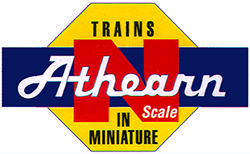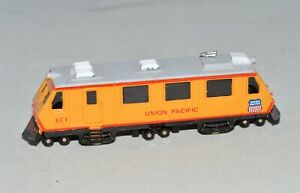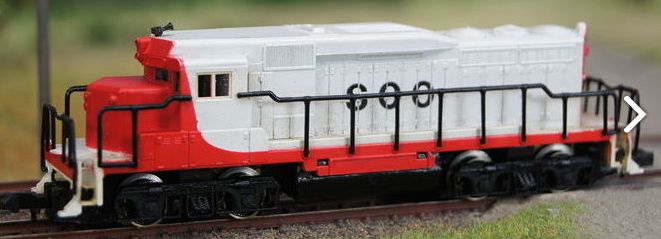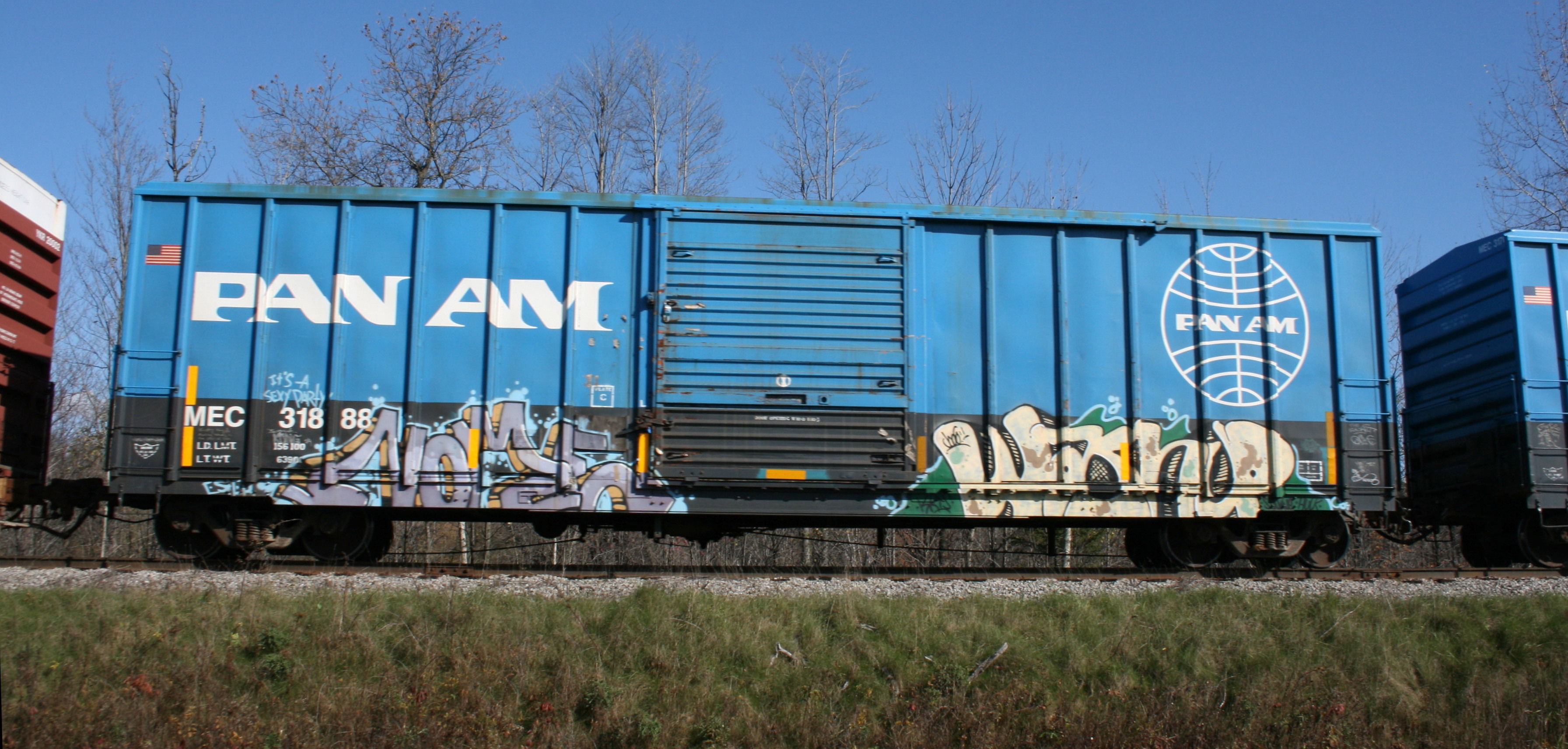Athearn - 24268 - Boxcar, 50 Foot, FMC, 5347 - Bath & Hammondsport - 25149
Click to see the details
market
Click to see the details
history
| Stock Number | 24268 |
| Original Retail Price | $21.98 |
| Brand | Athearn |
| Manufacturer | Athearn |
| Body Style | MDC Boxcar 50 Foot FMC Single Door |
| Image Provider's Website | Link |
| Prototype Vehicle | Boxcar, 50 Foot, FMC, 5347 (Details) |
| Road or Company Name | Bath & Hammondsport (Details) |
| Reporting Marks | BH |
| Road or Reporting Number | 25149 |
| Paint Color(s) | Dark Red and White |
| Print Color(s) | White and Black |
| Coupler Type | McHenry Magnetic Knuckle |
| Wheel Type | Chemically Blackened Metal |
| Wheel Profile | Small Flange (Low Profile) |
| Ready-to-Run | No |
| Announcement Date | 2016-09-01 |
| Release Date | 2017-10-01 |
| Item Category | Rolling Stock (Freight) |
| Model Type | Boxcar |
| Model Subtype | 50 Foot |
| Model Variety | FMC Single Door |
| Prototype Region | North America |
| Prototype Era | NA Era IV: 2nd Gen Diesel (1958 - 1978) |
| Scale | 1/160 |
Model Information:
Single Sliding Door Rib Side Without Roofwalk FMC. Originally designed by MDC Roundhouse. This tooling was acquired by Athearn in June of 2004 and re-released under the Athearn name. The MDC releases referred to this tooling as "FMC 50 Foot Boxcar - Single Door". Athearn refers to them as "FMC 5347 Box Car(sic)", but they are the same model.
The MDC Roundhouse releases typically came as kits (though some later releases were RTR) with an unpainted pewter underframe and truck-mounted couplers and blackened low-profile metal wheels. The Athearn releases have a nicer set of wheels (also low-profile). The Athearn models are always Ready-to-Run (RTR). The Athearn models have painted (black) underframes that are also metal (likely pewter or whatever MDC used). Athearn moved the couplers to become body-mounted and changed the coupling system from Rapido to McHenry. After inspecting them closely, I am not sure they can be swapped for MTL couplers without filing off part of the underframe, but I could be wrong. This presents a problem as McHenry couplers don't always play well with other couplers on long consists where that is a lot of force on each coupling point. The body has remained unchanged with the only detail part being the brake wheel.
The newer releases of this body style (as of 2017) market this boxcar as specifically modelling the FMC 5347 prototype.
The MDC Roundhouse releases typically came as kits (though some later releases were RTR) with an unpainted pewter underframe and truck-mounted couplers and blackened low-profile metal wheels. The Athearn releases have a nicer set of wheels (also low-profile). The Athearn models are always Ready-to-Run (RTR). The Athearn models have painted (black) underframes that are also metal (likely pewter or whatever MDC used). Athearn moved the couplers to become body-mounted and changed the coupling system from Rapido to McHenry. After inspecting them closely, I am not sure they can be swapped for MTL couplers without filing off part of the underframe, but I could be wrong. This presents a problem as McHenry couplers don't always play well with other couplers on long consists where that is a lot of force on each coupling point. The body has remained unchanged with the only detail part being the brake wheel.
The newer releases of this body style (as of 2017) market this boxcar as specifically modelling the FMC 5347 prototype.
Prototype History:
It was the mid 1970s, and the incentive per diem box car boom was just beginning. New, brightly painted box cars seemed to appear overnight. Many were lettered for various short lines. FMC (Food Machinery Corporation) was a significant builder of many of these cars. The 50’ outside post, non-terminating end box car, became the foundation for new per diem cars built in the 1970s. The 50’ FMC cars also varied in door configuration and style to better suit each customer. These cars can still be seen today at work (2017) on many ralroads.
The main difference between the 5077 cu. ft cars built by FMC vs the 5277-5347 cu. ft cars built by the same manufacturers is the overall height of the car, the smaller 5077 cars were Plate B while the larger 5277-5347 cars were Plate C.
The main difference between the 5077 cu. ft cars built by FMC vs the 5277-5347 cu. ft cars built by the same manufacturers is the overall height of the car, the smaller 5077 cars were Plate B while the larger 5277-5347 cars were Plate C.
Road Name History:
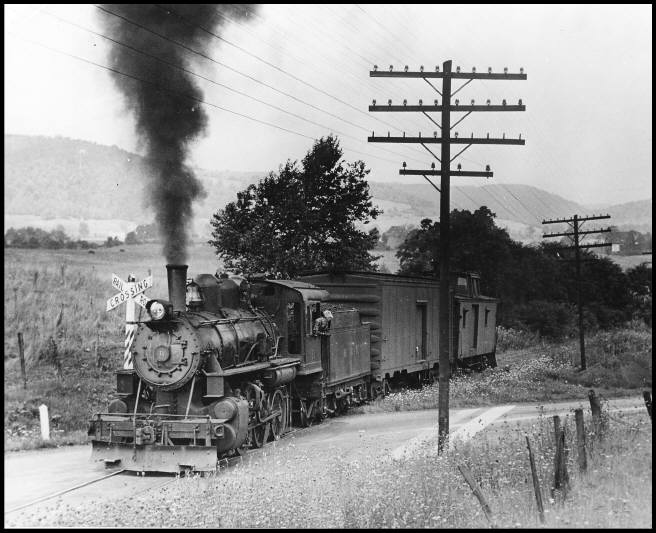 This line was built in 1872 to link Hammondsport to connections with the Erie and Delaware Lackawanna & Western in Bath, New York 9 miles away. Originally built as a 3’ gauge line, it was standard gauged in 1889. From 1903 until 1935 the B&H was controlled by the Erie but Erie applied to abandon it after the B&H suffered severe flood damage. A local group of investors stepped in, repaired the line and restored service. Freight traffic was primarily centered around the winery business and the B&H quickly picked up the nickname "The Champagne Trail." In-bound traffic included bottles and California wines for blending (in later decades, the latter was shipped by the tank car load!) Outbound traffic was primarily bottled wine. B&H also had a pair of TOFC ramps in Hammondsport. In 1976, Conrail spun off the connecting line at Bath to the County of Steuban and B&H became the designated operator. In 1996, the Livonia Avon & Lakeville took over the County owned route and the B&H. In 2001, they merged them with their Conhocton Valley Railroad subsidiary and renamed the whole thing B&H Rail. Today's B&H runs from Wayland to Painted Post, New York while the original line from Bath to Hammondsport is inactive.
This line was built in 1872 to link Hammondsport to connections with the Erie and Delaware Lackawanna & Western in Bath, New York 9 miles away. Originally built as a 3’ gauge line, it was standard gauged in 1889. From 1903 until 1935 the B&H was controlled by the Erie but Erie applied to abandon it after the B&H suffered severe flood damage. A local group of investors stepped in, repaired the line and restored service. Freight traffic was primarily centered around the winery business and the B&H quickly picked up the nickname "The Champagne Trail." In-bound traffic included bottles and California wines for blending (in later decades, the latter was shipped by the tank car load!) Outbound traffic was primarily bottled wine. B&H also had a pair of TOFC ramps in Hammondsport. In 1976, Conrail spun off the connecting line at Bath to the County of Steuban and B&H became the designated operator. In 1996, the Livonia Avon & Lakeville took over the County owned route and the B&H. In 2001, they merged them with their Conhocton Valley Railroad subsidiary and renamed the whole thing B&H Rail. Today's B&H runs from Wayland to Painted Post, New York while the original line from Bath to Hammondsport is inactive.

Brand/Importer Information:
Athearn's history began in 1938, when its founder-to-be, Irvin Athearn, started an elaborate O scale layout in his mother's house. After placing an ad selling the layout, and receiving much response to it, Irv decided that selling model railroads would be a good living. He sold train products out of his mother's house through most of the 1940s. After becoming a full-time retailer in 1946, Irv opened a separate facility in Hawthorne, California in 1948, and that same year he branched into HO scale models for the first time.
Athearn acquired the Globe Models product line and improved upon it, introducing a comprehensive array of locomotive, passenger and freight car models. Improvements included all-wheel drive and electrical contact. One innovation was the "Hi-Fi" drive mechanism, employing small rubber bands to transfer motion from the motor spindle to the axles. Another was the double-ended ring magnet motor, which permitted easy connection to all-wheel-drive assemblies. Athearn was also able to incorporate flywheels into double-ended drives.
The company produced a model of the Boston & Maine P4 class Pacific steam locomotive which incorporated a cast zinc alloy base and thermoplastic resin superstructure. It had a worm drive and all power pickup was through the bipolar trucks that carried the tender. This item was discontinued after the Wilson motor was no longer available, and was not redesigned for a more technologically advanced motor.
Athearn's car fleet included shorter-than-scale interpretations of passenger cars of Southern Pacific and Atchison, Topeka & Santa Fe Railroad prototypes. The company also offered a variety of scale-length freight cars with sprung and equalized trucks. The cars could be obtained in simple kit form, or ready-to-run in windowed display boxes. The comprehensive scope of the product line contributed to the popularity of HO as a model railroad scale, due to the ready availability of items and their low cost.
Irv Athearn died in 1991. New owners took control in 1994, but continued to follow Athearn's commitment to high-quality products at reasonable prices. Athearn was bought in 2004 by Horizon Hobby. Athearn was then moved from its facility in Compton to a new facility in Carson, California. In mid-2009, all remaining US production was moved to China and warehousing moved to parent Horizon Hobby. Sales and product development was relocated to a smaller facility in Long Beach, California.
Read more on Wikipedia and Athearn website.
Athearn acquired the Globe Models product line and improved upon it, introducing a comprehensive array of locomotive, passenger and freight car models. Improvements included all-wheel drive and electrical contact. One innovation was the "Hi-Fi" drive mechanism, employing small rubber bands to transfer motion from the motor spindle to the axles. Another was the double-ended ring magnet motor, which permitted easy connection to all-wheel-drive assemblies. Athearn was also able to incorporate flywheels into double-ended drives.
The company produced a model of the Boston & Maine P4 class Pacific steam locomotive which incorporated a cast zinc alloy base and thermoplastic resin superstructure. It had a worm drive and all power pickup was through the bipolar trucks that carried the tender. This item was discontinued after the Wilson motor was no longer available, and was not redesigned for a more technologically advanced motor.
Athearn's car fleet included shorter-than-scale interpretations of passenger cars of Southern Pacific and Atchison, Topeka & Santa Fe Railroad prototypes. The company also offered a variety of scale-length freight cars with sprung and equalized trucks. The cars could be obtained in simple kit form, or ready-to-run in windowed display boxes. The comprehensive scope of the product line contributed to the popularity of HO as a model railroad scale, due to the ready availability of items and their low cost.
Irv Athearn died in 1991. New owners took control in 1994, but continued to follow Athearn's commitment to high-quality products at reasonable prices. Athearn was bought in 2004 by Horizon Hobby. Athearn was then moved from its facility in Compton to a new facility in Carson, California. In mid-2009, all remaining US production was moved to China and warehousing moved to parent Horizon Hobby. Sales and product development was relocated to a smaller facility in Long Beach, California.
Read more on Wikipedia and Athearn website.
Item created by: gdm
on 2017-10-25 20:59:56
If you see errors or missing data in this entry, please feel free to log in and edit it. Anyone with a Gmail account can log in instantly.
If you see errors or missing data in this entry, please feel free to log in and edit it. Anyone with a Gmail account can log in instantly.



